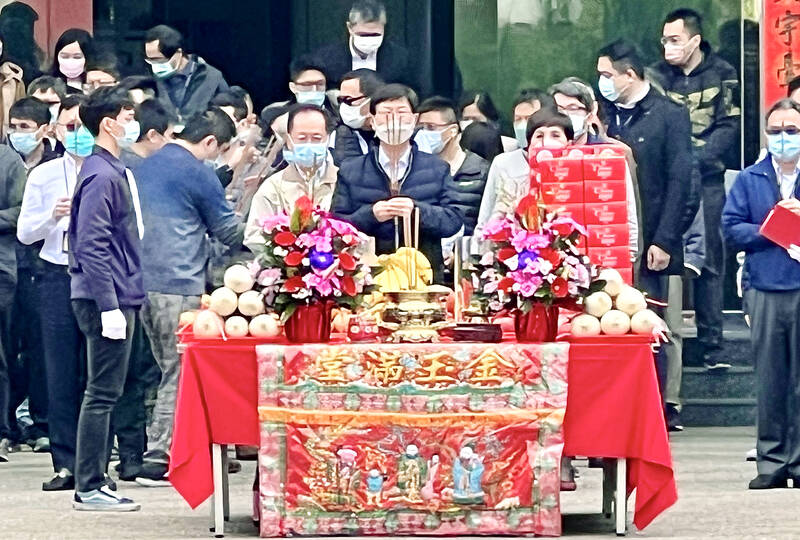Hon Hai Technology Group (鴻海科技集團), also known as Foxconn Technology Group (富士康科技集團) internationally, yesterday said it was confident that its performance would improve in the second half of this year.
Investment plans related to electric vehicles (EVs) in different parts of the world are expected to gradually start coming to fruition, Hon Hai chairman Young Liu (劉揚偉) told reporters after leading a new year’s prayer at the company’s headquarters in New Taipei City’s Tucheng District (土城).
Major challenges stemming from the COVID-19 pandemic and the Russia-Ukraine war continue to affect the global economy.

Photo: Fang Wei-chieh, Taipei Times
However, Liu said that he expects a turnaround in the second half of the year, despite lackluster predictions for the first and second quarters.
He said he would probably visit Hon Hai clients in the US next month or in April, and plans to visit Hon Hai’s EV plant in Ohio, which is the product of a manufacturing agreement between the world’s largest electronics manufacturer and US-based Lordstown Motors Corp in May last year.
Liu is likely to announce new investment plans in the Wisconn Valley Science and Technology Park in Wisconsin during the visit, he said.
A trip to Mexico is also possible, as Hon Hai plans to launch new investments there, in addition to PCE Technology de Juarez SA de CV, in which the company has a 84.5 percent controlling stake, Liu said.
PCE Technology assembles consumer electronics, and market analysts have speculated that Hon Hai aims to boost its consumer home appliance processing business outside China, due to the US-China trade dispute and the effects of COVID-19, which have forced firms to re-examine global supply chains.
The company is also working on an EV components investment project in Europe and plans to launch new EV models on Hon Hai Tech Day later this year, Liu said.
Japanese automobile industry veteran Jun Seki yesterday took over the role of Hon Hai’s chief strategy officer for EV operations.
Seki’s management experience in the Japanese auto industry and global EV supply chains would help the group better integrate EV resources and development in Taiwan, Liu said.

BYPASSING CHINA TARIFFS: In the first five months of this year, Foxconn sent US$4.4bn of iPhones to the US from India, compared with US$3.7bn in the whole of last year Nearly all the iPhones exported by Foxconn Technology Group (富士康科技集團) from India went to the US between March and last month, customs data showed, far above last year’s average of 50 percent and a clear sign of Apple Inc’s efforts to bypass high US tariffs imposed on China. The numbers, being reported by Reuters for the first time, show that Apple has realigned its India exports to almost exclusively serve the US market, when previously the devices were more widely distributed to nations including the Netherlands and the Czech Republic. During March to last month, Foxconn, known as Hon Hai Precision Industry

Taiwan Semiconductor Manufacturing Co (TSMC, 台積電) and the University of Tokyo (UTokyo) yesterday announced the launch of the TSMC-UTokyo Lab to promote advanced semiconductor research, education and talent development. The lab is TSMC’s first laboratory collaboration with a university outside Taiwan, the company said in a statement. The lab would leverage “the extensive knowledge, experience, and creativity” of both institutions, the company said. It is located in the Asano Section of UTokyo’s Hongo, Tokyo, campus and would be managed by UTokyo faculty, guided by directors from UTokyo and TSMC, the company said. TSMC began working with UTokyo in 2019, resulting in 21 research projects,

Taiwan’s property market is entering a freeze, with mortgage activity across the nation’s six largest cities plummeting in the first quarter, H&B Realty Co (住商不動產) said yesterday, citing mounting pressure on housing demand amid tighter lending rules and regulatory curbs. Mortgage applications in Taipei, New Taipei City, Taoyuan, Taichung, Tainan and Kaohsiung totaled 28,078 from January to March, a sharp 36.3 percent decline from 44,082 in the same period last year, the nation’s largest real-estate brokerage by franchise said, citing data from the Joint Credit Information Center (JCIC, 聯徵中心). “The simultaneous decline across all six cities reflects just how drastically the market

Ashton Hall’s morning routine involves dunking his head in iced Saratoga Spring Water. For the company that sells the bottled water — Hall’s brand of choice for drinking, brushing his teeth and submerging himself — that is fantastic news. “We’re so thankful to this incredible fitness influencer called Ashton Hall,” Saratoga owner Primo Brands Corp’s CEO Robbert Rietbroek said on an earnings call after Hall’s morning routine video went viral. “He really helped put our brand on the map.” Primo Brands, which was not affiliated with Hall when he made his video, is among the increasing number of companies benefiting from influencer